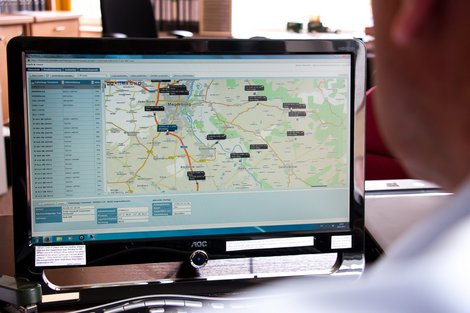Hövelmann Logistik commits to digital solutions for superior competitiveness

Digitalisation as a future opportunity in the logistics sector
The logistics sector in Germany remains a growing market. As the third-biggest economic sector after the automotive industry and retail, in 2018, German logistics companies generated sales totalling approximately 274 billion Euros*. Increasing price pressure and considerable competitive pressure are forcing businesses to be more cost efficient. Frank Maslock, Branch Manager of Hövelmann Logistik GmbH & Co. KG in Haldensleben, considers digitalisation a necessity both for competitiveness and to ensure the long-term, profitable survival of his company. As a classic medium-sized family business, with the measures it has implemented on a gradual basis since 2010, the company is a good example of how digitalisation is both achievable and indispensable for medium-sized businesses.
New paths in the family business: telematics, automation and digitalisation
Hövelmann Logistik, a family business, was founded in 1945 in the town of Rees am Niederrhein, where its head office is still located today. The company has also been based in Saxony-Anhalt since 1991. Its location in Haldensleben, which occupies an area of approximately 50,000 m², is now the company's biggest. With more than 600 employees and some 230 trucks, Hövelmann Logistik is a medium-sized player in the logistics sector in Germany. When it comes to digitalisation, the company is proceeding along the path to the "Logistics 4.0” on an innovative and forward-looking basis.
Since 2010, all of its trucks have gradually been equipped with telematics. A high-precision system for positioning, navigation and communication is used, which allows for efficient fleet management. Real-time data on positioning, traffic flow, driving and rest times and driving behaviour are registered and analysed. The drivers obtain the optimum route in terms of the journey time and costs. The scheduler is able to check whether a vehicle - with sufficient loading capacity and driving time - is available at short notice. This reduces the response time considerably. The administration of the staff is also relieved through automated expenses evaluation and the administration and optimisation of the driving and rest times. The data gathered on driving style and driving behaviour are used for driver training, a task for which Hövelmann has hired two driver trainers. "If our drivers use one litre less of fuel per 100 kilometres as a result of these measures, with over 27 million kilometres per year, that makes a big difference," says Maslock. "We are also improving our service to our customers all the time.”
At Hövelmann Logistik, scheduling plans based on paper documentation are a thing of the past. All trips are digitally planned with a freight forwarding software package and the orders are transferred directly to the vehicle via telematics. If the driver confirms the order, the route is prepared automatically in the navigation. This process saves time and prevents planning errors. The personnel planning is also completed digitally using the freight forwarding software. The shift schedules are created quickly and succinctly, with holiday and illness times being taken into account: they are therefore efficiently planned. The visual inspection of driving licences has also been simplified using an RFID chip, provided that the drivers have given their consent.
In the warehouse, the processes are optimised with digital help. A "pick by voice storage system" simplifies the order picking by allowing the employee to receive the information via headphones without having to operate a paper or scanner. Starting next year, a Warehouse Management System (WMS) is to be used for the store management, which features an interface with the forwarding software and thus further simplifies and structures the processes.
Digitalisation requires willpower
As successful as the individual measures have been in terms of their impact the success of the company, their implementation has also come at a cost. The implementation of a digitalisation concept, which in a medium-sized company is usually carried out with in-house staff, requires willpower as well as a high degree of performance and commitment from all of those involved in the project. "It is certainly true that digitalisation strengthens the control mechanisms," emphasizes Maslock. "But with the added value for the employees, such as the payment of bonuses when our targets are reached, we have been able to convince our employees of the benefits of digitalisation and to inspire them."
From Maslock's perspective, the most frequent obstacles to digitalisation in the world of medium-sized logistics are a lack of time and staff resources, becoming bogged down in tried and tested patterns and processes that have functioned until now, and different investment approaches in comparison with big companies. A family business rarely embarks on high risks for innovations.
Depending on the structure and configuration of the company, not all new technologies are appropriate. Hövelmann Logistik has also tested driverless transport systems in its warehouse. However, these are not yet suitable from either a structural or organisational perspective. "Digitalisation is a continuous process for us," explains Maslock. "We're looking at new ideas and thinking about how we can better position ourselves for the future." As of 4 June, the company will be exhibiting at the joint stand for the federal state of Saxony-Anhalt at the transport logistic event in Munich, the leading international trade fair for logistics, mobility, IT and supply chain management.
Author: Miriam Fuchs
*Source: the German Federal Association for Logistics e.V. (BVL) https://www.bvl.de/service/zahlen-daten-fakten/umsatz-und-beschaeftigung
